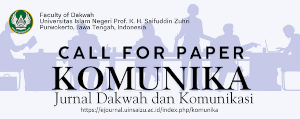MEMBANGUN DESAIN DAN MODEL ACTION RESEARCH DALAM STUDI DAN AKSI PEMBERDAYAAN MASYARAKAT
DOI:
https://doi.org/10.24090/komunika.v10i1.869Keywords:
action research, empowerment, participationAbstract
This paper will describe the action research as one of the alternative method of study and action research in community empowerment. Action research is based on the assumption that the research agenda should be linked with changes in society. Action research is not only to obtain the truth alone, but also to create conditions that are expected. Action research can be used effectively in the study of community empowerment and action given the characteristics of the importance of active citizen participation. Through action research it can be derived a formula according to the condition of society in its efforts to empower the community. Tulisan ini akan menguraikan tentang action research (penelitian tindakan) sebagai salah satu alternatif metode penelitian dalam studi dan aksi pemberdayaan masyarakat. Penelitian tindakan didasarkan kepada asumsi bahwa penelitian harus dihubungkan dengan agenda perubahan dalam masyarakat. Penelitian tindakan dilakukan tidak hanya untuk memperolehkebenaran semata namun juga menciptakan kondisi yang diharapkan. Penelitian tindakan dapat digunakan secara efektif dalam kajian maupun aksi pemberdayaan masyarakat mengingat karakteristiknya yang mementingkan partisipasi warga masyarakat secara aktif. Melalui penelitian tindakan akan dapat dihasilkan formula yang sesuai dengan kondisi masyarakat dalam melakukan upaya pemberdayaan masyarakat.Downloads
Download data is not yet available.
References
Adi, Isbandi R. (2013). Intervensi Komunitas dan Pengembangan Masyarakat: Sebagai Upaya Pemberdayaan Masyarakat. Jakarta : Rajawali Pres
Coghlan, David & Brannick, Teresa. (2005). Doing Action Research in Your Own Organization, 2nd edition. London : Sage Publication Ltd.
Koshy, Valsa. (2005). Action Research for Improving Practice: A Practical Guide. London : Sage Publication Ltd.
McNiff, Jean &Whitehead,Jack. (2002). Action Research: Principles and Practice. London : RoutledgeFalmer.
Stringer, Ernest T. (1996). Action Research: A Handbook for Practitioners. Los Angeles : Sage Publication, Inc.
Suharto, Edi. (1997). Pembangunan, Kebijakan Sosial dan Pekerjaan Sosial: Spektrum Pemikiran. Bandung : Lembaga Studi Pembangunan STKS.
_____ . (2013). Membangun Masyarakat Memberdayakan Rakyat. Bandung : PT. Refika Aditama
Yaumi, M. & Damopolil, M. (2014). Action Research: Teori, Model, & Aplikasi. Jakarta: Penerbit Kencana.
Coghlan, David & Brannick, Teresa. (2005). Doing Action Research in Your Own Organization, 2nd edition. London : Sage Publication Ltd.
Koshy, Valsa. (2005). Action Research for Improving Practice: A Practical Guide. London : Sage Publication Ltd.
McNiff, Jean &Whitehead,Jack. (2002). Action Research: Principles and Practice. London : RoutledgeFalmer.
Stringer, Ernest T. (1996). Action Research: A Handbook for Practitioners. Los Angeles : Sage Publication, Inc.
Suharto, Edi. (1997). Pembangunan, Kebijakan Sosial dan Pekerjaan Sosial: Spektrum Pemikiran. Bandung : Lembaga Studi Pembangunan STKS.
_____ . (2013). Membangun Masyarakat Memberdayakan Rakyat. Bandung : PT. Refika Aditama
Yaumi, M. & Damopolil, M. (2014). Action Research: Teori, Model, & Aplikasi. Jakarta: Penerbit Kencana.
Downloads
Published
2017-02-01
Issue
Section
Articles
License
Authors who publish with this journal agree to the following terms:
- Authors retain copyright and grant the journal right of first publication with the work simultaneously licensed under a Creative Commons Attribution-ShareAlike 4.0 International License that allows others to share the work with an acknowledgement of the work's authorship and initial publication in this journal.
- Authors are able to enter into separate, additional contractual arrangements for the non-exclusive distribution of the journal's published version of the work (e.g., post it to an institutional repository or publish it in a book), with an acknowledgement of its initial publication in this journal.
- Authors are permitted and encouraged to post their work online (e.g., in institutional repositories or on their website) prior to and during the submission process, as it can lead to productive exchanges, as well as earlier and greater citation of published work (See The Effect of Open Access).

























